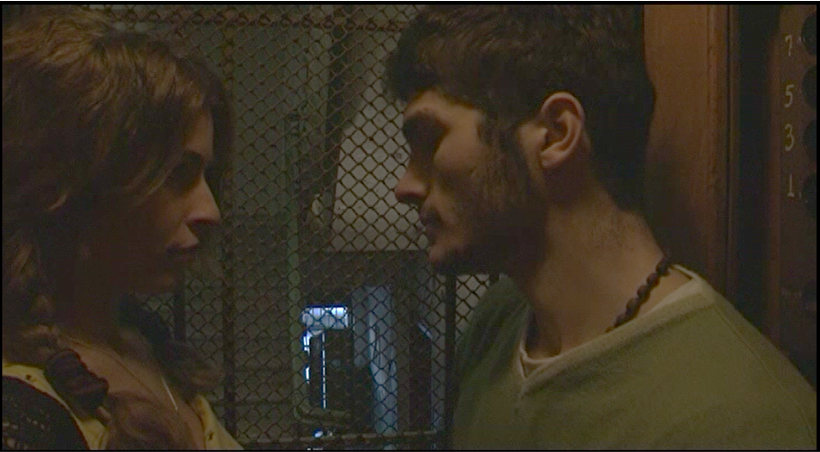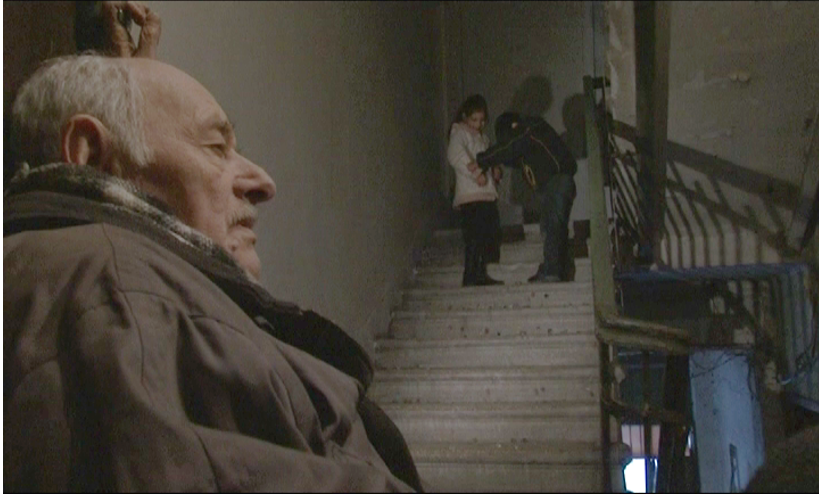From the very first days of its birth, cinema has always tried to realize its main "task"- to tell a story in an interesting way with independent and original audiovisual methods. Logically, the methods, forms and content of cinematic narration and delivery have undergone large-scale development and transformation during its existence. Neither is it unusual that the main characters of films, who are not only in the center of attention but also become "narrators" themselves, are not directly human, but also other spiritual or non-spiritual beings.
Natia Nikoleishvili chose as the "main hero" in her student film, "Iron Chronicler" (2019), precisely the non-spiritual multi-story building elevator, which, apart from being a semi-dismantled, cracked and rusted four-walled structure typical of the old buildings still preserved in the capital of Georgia, at the same time acquires a sentimental function and becomes a witness and chronicler of the events not only in the building entrance but also outside. In the course of this 15-minute short film, the director "does not take" the audience out of the elevator and observes the lives of people living in a particular entrance from inside, with its own "eyes" which develops in step with the political and social events of modern Georgia since the Second World War. The elevator witnesses everything - be it a birth, a wedding, the declaration of the Second World War and 50 years later the independence of Georgia, as well as death, youthful rows, the first secret kiss of loved ones, etc.
In addition to the fact that, in a way, the subjective viewpoint of the elevator as a character and the so-called phenomenon of POV is introduced, the second hero, Dato is also outlined around whom the action develops - from birth to death. Dato's mother gives birth in the elevator, little Dato's father is called up into the war, the teenage boy has to have his first kiss in the elevator, later the newlyweds are seeing off by their friends and neighbors, and finally, leaving the building, already very old, he passes away in the elevator.
The main focus, conceptually and in accordance with the title, shifts onto the elevator. Such a choice of the director, where she turns the space and non-spiritual characters into the main characters, brings in specific people in parallel with it and observes them for a certain period of time by an inanimate object (specifically, against the background of changing historical events), in a way resembles dramatic and ideological structure of Ettore Scola’s famous musical film "Le Bal," where the author introduces the 50-year history of France in the form of a dance hall and twenty characters.
The attempt of the director and her creative team to make the film look like a good student work with a conceptual idea and a rather intriguing story, unfortunately, is hindered by the completely unnatural and unbelievable (often artificial, "pretentious" or unconfident) performance of the actors, which continues to be an actual problem not only in student film but in performing arts in general (the best actors, however, are "elevator" and extremely aged Dato).

It should be noted that in the scene of Dato's death, there is an interesting attempt at in-frame montage, where death and life, old age and youth are contrasted in one space: when Dato is on the verge of death, the camera focuses on him with time lapse symbolizing his death, on the opposite side, in the background, small children (also here unconvincingly) are playing. And the boy breaks the girl's bracelet, causing the parts of the bracelet to clatter down the stairs. A non-static and moving shot with such a composition, in a way, resembles an imitation-echo of Wong Kar-Wai and Christopher Doyle’s famous style, which emphasizes the character's misfortune and loneliness, alienation to the death of others with an emotional load from the outside world. The main thing is that the cameraman (Yuri Abzhandadze) tries well to close the space as much as possible, to add claustrophobia to it and keep the minimalism, thus to maintain the phenomenon of being locked in the elevator. In addition, the editing (Natia Nikoleishvili and Irakli Makatsaria) is naturally "broken" and transitional, which, depending on the film, resembles the opening of the elevator door and its moving action with great difficulty, although, on the other hand, it still approaches the style of "natural" processing and editing from which Georgian student film has not completely gone away from and still believes in the appearance of a rough transition.
Time changes, equipment "ages" along with people, and the old elevator, which many residents have been waiting for a long time to work properly, will have a day of repairs and visits by technicians, although the film ends with, at a glance, going up to an unknown floor of the repaired elevator, where the door opens and a kind of pantry is visible, which is empty. Two assumptions remain: the elevator will continue to serve the residents and observe new adventures in a renewed form, or it, together with Dato, will end its life, because, despite external changes and renovations, it will become as old and useless as the things that were long ago thrown into the pantry and forgotten by the owners, once important and sacred for someone, as even Dato's existence in his time. However, taking into account the function of the building, the elevator will never lose its relevance, because it is still needed for movement. Thus, being like a living being the elevator is given that "melodramatic character," in which people with their own problems, hardships or joys will temporarily flash and then disappear, and the elevator will "catch" and store all this and finally go up to the pantry, where it will finally "house" and will "archive."
Despite several flaws, "Iron Chronicler" more or less manages to justify the non-traditional story and offers an interesting adventure to the audience with its content, and Natia Nikoleishvili will probably be able to tackle more dramaturgical and creative difficulties in the future.
Eter Parchukidze,
MA student in Film Studies






